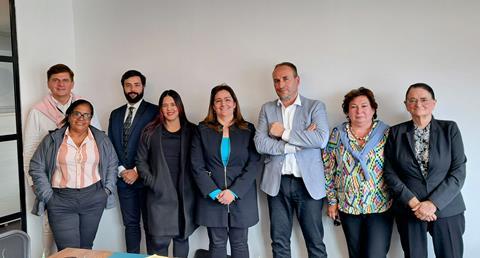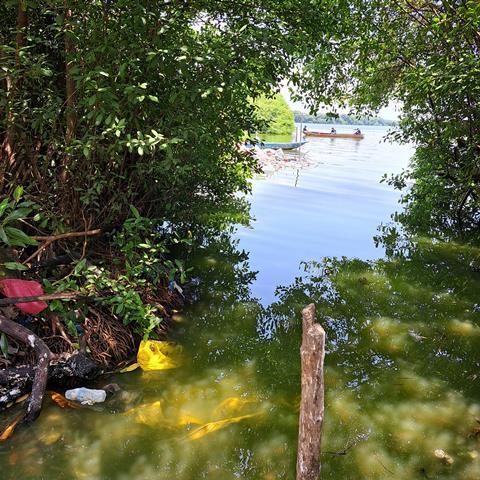The 8th International Delegation of Jurists, known as the Colombia Caravana, has just returned from Colombia following its investigation into the situation of human rights defenders in the post Peace Accord period.
The Caravana was launched in 2008 in Chancery Lane in a joint initiative of the Law Society’s Human Rights Committee and the Westminster & Holborn Law Society. Over the past 16 years, the international delegation has visited every two years (and virtually in 2020) with lawyers from 24 countries. In August 2024 lawyers from Canada, France, Italy, Poland, Portugal, Spain, and the UK joined their Colombian colleagues in travelling to remote regions where indigenous and Afro descendent communities are at risk of threats, attacks and assassinations.
!n 2022 Gustavo Petro was elected president and made history as the first left wing, former guerrilla from the 1990s to become president. He had served as mayor of Bogotá and was elected on great hopes for change and real implementation of the Peace Accord signed in 2016 with the Revolutionary Armed Forces of Colombia (FARC) guerrillas. His theme for his first two presidential years was: total peace.
The 22 members of the delegation met communities in five regions and listened to testimonies from the most affected by the conflict, who had the most investment in peace. My region was Magdalena and the Sierra Nevada in the North of Colombia reaching to the Caribbean coast in Santa Marta. I was with lawyers from Poland and Portugal and our hosts from Colombia.

We arrived by minibus to meet with Afro descendent women who had suffered over 30 years of hardship, threats, rapes, racism and attacks. They had lost three of their community who were killed by paramilitary gangs in the Sierra Nevada. A bumpy ride along dusty tracks led us to the house of one of the Sierra Nevada women, Isabel, who told us the story of their community.
We met 10 women in Isabel’s house. They are members of fishing families affected by an environmental disaster in the 1990s. The fishing industry was wiped out because of pollutants entering the water killing the fish. The community was offered land to farm by the government, but it was in a war zone. They were sent there by the state who knew that the area was a corridor of activity by guerrillas, paramilitary groups and the Colombian army. Armed gangs now fight it out for control of territory for land and the coca trade, or migrant and other trafficking. The women and their families were harassed daily, subjected to sexual abuse and rape, their children kidnapped for recruitment into armed gangs. They left the area after three years and settled around the northern part closer to the coast. We met them in Ciénega Grande de la Sierra Nevada and a second group of seven women in Pueblo Viejo during our visit.
In 1995 the women formed an association of women farmers. Their members are now dispersed in Pueblo Viejo, Ciénaga, Aracataca, Retén, Pivijay, and Fundación in the Banana Zone of the Magdalena department. They have been seeking reparation for 28 years. For the last 16 they have been supported by the lawyers of the Association of Women’s Collective for the Law (ASOCOLEMAD), a feminist collective who hosted our visit and introduced us to the community members living around the Ciénaga Grande lagoon. It is the largest coastal lagoon complex in Colombia and one of the most strategic for life on the planet. It covers 528,000 hectares. The lagoon is the largest wetland complex in Colombia, home to rare birds, reptiles, monkeys, fish, and dense vegetation, and is protected under the Ramsar Convention by UNESCO. It could be a haven of great beauty were it not for the pollution and destruction of the environment.
Territorial disputes by various armed groups abound with the community subject to crimes against humanity including forced displacement, massacres, sexual violence, recruitment of minors, slavery, disappearances, as well as illicit crops, wildlife trafficking, induced droughts, livestock farming, mining, deforestation, and monoculture of invasive species. This ecosystem is an unrecognised victim of the armed conflict. Violence persists with the presence of paramilitaries, and the state’s armed forces, as well as private security groups tied to large economic interests in the territory.
ASOCOLEMAD has developed its approach to the law entitled ecofeminism. The lawyers are a feminist collective including men, who understand the need to fight for the rights of women and the environment. In the context of Magdalena, it is women who are exercising their legal rights with 300 individual claims against the state in the Colombian courts to the highest level and then to the InterAmerican Commission for Human Rights. Two of the lawyers and three of the women presented their case at the InterAmerican Commission in April 2024. ASOCOLEMAD has also brought group actions and macro claims in the transitional justice procedure.
The main challenge for the community is that the existing laws in Colombia, such as the Land Restitution Law and the Victim’s Law are not properly implemented, and the community has suffered displacement, trauma, and lack of economic activity for decades and their case needs to be settled in the many ways that the community call for. Their case is not just about their individual and collective needs, but also about the environment itself and the continuing damage done to the environment.
The women showed us the lagoon in Pueblo Viejo which we could see is badly contaminated with rubbish (pictured). Not only industrial and household rubbish, but also waste from the extractive industries, enters the waters. This is not new, the lagoon was the subject of extreme pollution three decades ago, and remains so.

We heard their shocking testimonies, and as we began to understand the work of the lawyers, we heard the testimony of the family of Luz Estela Romero, one of their lawyers, who received not only threats and attacks from paramilitaries because of her work on behalf of the families, but who five years ago was devastated when her 17 year old son was kidnapped. He was taken to a police station where he was tortured and raped, even though he protested that he was 17 and needed his parents. Following his release, hospitalisation and psychological trauma, Luz Estela took him into exile in Spain.
To understand this situation and the context, we heard from the women and their lawyers, how the paramilitaries have moved in to fill a gap left by the state in then transitional process since the peace agreement was signed in 2016. As the FARC guerrillas laid down their arms and moved into the transitional justice system, paramilitaries moved into the remote areas left empty. It was more complicated than that, there were some FARC groups who did not surrender and are known as dissidents, there are returned FARC who left the peace process when they saw that their colleagues were being assassinated in the cities because they had no protection. There are many more paramilitary groups than before, to the extent that experts say you cannot speak of one conflict as in the past, but at least seven conflict zones. Paramilitaries now extract protection money from local businesses and give out their logos so that other groups will know that they command the territory and the businesses are under their protection. The state is no longer present. In some municipalities, a paramilitary leader has been elected mayor. The police and local state are infiltrated by the paramilitaries. When Luz Estela’s son was kidnapped, he fell prey to police infiltration. Targets of paramilitaries are those who represent the state, and those who uphold the system, and the peace process. Experts told us that the state no longer has the capacity to provide protection for human rights defenders. I participated in a small meeting with the new minister of justice Angela Buitrago. She expressed interest in our report and her commitment to bring about change. She has been in post for only two months.
As we left Colombia and returned to our countries at the beginning of September, the delegates expressed their determination to publicise the voices of those who live far from Bogotá and the seat of government and ministry decision making, the voices of those who consider themselves forgotten and invisible. An opportunity for readers to meet members of the delegation and one of the indigenous leaders will be at the launch of the Caravana report in parliament in October.
Check the website for information.
Professor Sara Chandler KC (Hon) is a past Law Society Council member and past chair of the Human Rights Committee































No comments yet